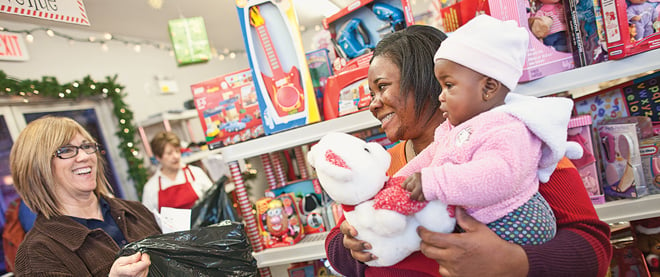Are members of organized religions inherently more generous?
Why faith may explain why Abbotsford, B.C., is Canada’s most generous city
Simon Hayter
Share

When the management team of Vancouver’s Canuck Place children’s hospice met a few years back to consider a fundraising campaign to build a facility to meet the growing needs of the Fraser Valley, they were advised it was folly to consider a multi-million-dollar capital project in the teeth of a recession, says Filomena Nalewajek, CEO of Canuck Place.
She admits the board wavered before pressing ahead last year after making one key decision: they would locate the hospice in Abbotsford. “We did our homework and recognized we were going into a community that was different,” she says. “We just didn’t know how different.” A year later, the campaign is already “a stone’s throw” from hitting its $13-million target, says Nalewajek. “It is because of that community. It is unbelievable. It is unprecedented, especially in this economic climate.”
For nine years in a row, the tax filers of Abbotsford-Mission have given the largest per-capita charitable donations in Canada, Statistics Canada reported in December. Overall, Canadians gave $8.3 billion in 2010 to charities, based on income tax returns. The median Canadian donation was $260 per person, meaning half of donors gave more and half gave less. In Abbotsford and neighbouring Mission, however, the median donation was $610, which is impressive considering the median income is a modest $46,490. Calgary was next highest among metropolitan areas with a median donation of $380—but with a median annual income some $20,000 higher.
Ask observers why the Abbotsford area is so uncommonly generous, and invariably they note it is the heart of the Bible belt of B.C. There are about 90 churches in Abbotsford alone, including some of the largest in the country. As well, the community benefits from its vibrant, long-established Sikh, Muslim and Jewish communities. “There’s a faith base and there’s multiculturalism, people coming from abroad and knowing what it’s like to not have a lot to start off with,” says Hugh Franklin, a supervisor at the Abbotsford Food Bank and Christmas Bureau.
However, Dave Murray, the food bank director, questions how much of the donations go to church overheads and salaries. As well, Abbotsford attracts like-minded organizations, including a couple of Bible colleges, the provincial headquarters for the Mennonite Central Committee, which conducts relief and missionary work around the globe, and the national office of American fundamentalist preacher Charles R. Swindoll, among others, he notes. Still, he says there’s no denying faith-based institutions instill a culture of giving, though this year he frets that donations to the food bank are lagging by 20 per cent. “Eighty per cent of our budget comes in December-January, so it’s pretty stressful.”
Are members of organized religions inherently more generous? The short answer seems to be yes, but the devil is in the details. “Religious people do tend to give more than non-religious people,” says Michael Wilkinson, a sociologist specializing in religion at Trinity Western University in the Fraser Valley. This generosity is at the foundation of many faiths, he says. “It’s part of their value system. They’re motivated to give; they believe they’re doing something that’s important for the community. They believe they are involved in something bigger than themselves.”
When charities seek to learn what motivates donors, they often turn to Cygnus Applied Research, a Hamilton-based company that tracks donor intentions and charitable trends in the U.S. and Canada. Its annual survey of some 22,000 donors on both sides of the border confirms religious conviction has a major impact on philanthropy, says company president Penelope Burk. “It’s not just giving to one’s own faith,” she says. “Actively religious donors are more likely to give to, stay loyal to and give at a higher level to other causes.” Its survey of some 4,100 Canadians who regularly give to charity found the average donation in 2010 for those professing no religion was $2,345. Those who identified as “spiritual” gave an average $2,889. Those who called themselves “actively religious”—about one donor in five—gave an average $7,178.
Perhaps those numbers help explain why Quebecers—in what is considered Canada’s most secular province—give the least to charity. The median donation claimed by tax filers there was just $130.
Nationally, donations climbed by 6.5 per cent after a recessionary 2009, but Burk warns charities face a looming problem. Her surveys find the number of religious young people is falling, and with it the level of donations. The tiny minority of those under 35 who define themselves as religious gave over five times more generously than others their age, she says. As the influence of religion wanes among younger people (even in Abbotsford the average age of donors was 52), she wonders what is needed to instill a higher level of philanthropy: “I don’t know what the answer to that question is.”